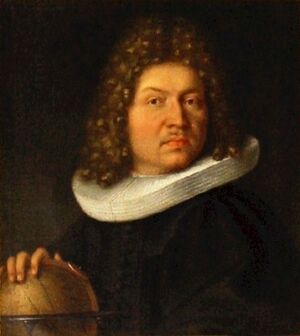Jacob Bernoulli (nonfiction): Difference between revisions
Jump to navigation
Jump to search
(Created page with "Jacob Bernoulli (also known as James or Jacques; 6 January 1655 [O.S. 27 December 1654] – 16 August 1705) was one of the many prominent mathematicians in the Bernoulli famil...") |
No edit summary |
||
| (2 intermediate revisions by the same user not shown) | |||
| Line 1: | Line 1: | ||
Jacob Bernoulli (also known as James or Jacques; 6 January 1655 [O.S. 27 December 1654] – 16 August 1705) was one of the many prominent mathematicians in the Bernoulli family. He was an early proponent of Leibnizian calculus and had sided with Leibniz during the Leibniz–Newton calculus controversy. He is known for his numerous contributions to calculus, and along with his brother Johann, was one of the founders of the calculus of variations. He also discovered the fundamental mathematical constant e. | [[File:Jacob_Bernoulli.jpg|thumb|Jacob Bernoulli.]]'''Jacob Bernoulli''' (also known as James or Jacques; 6 January 1655 [O.S. 27 December 1654] – 16 August 1705) was one of the many prominent mathematicians in the Bernoulli family. | ||
He was an early proponent of Leibnizian calculus and had sided with Leibniz during the [[Leibniz–Newton calculus controversy (nonfiction)|Leibniz–Newton calculus controversy]]. | |||
He is known for his numerous contributions to calculus, and along with his brother [[Johann Bernoulli (nonfiction)|Johann]], was one of the founders of the calculus of variations. | |||
He also discovered the fundamental mathematical constant e. | |||
His most important contribution was in the field of probability, where he derived the first version of the law of large numbers in his work ''Ars Conjectandi''. | |||
== In the News == | == In the News == | ||
| Line 10: | Line 18: | ||
== Nonfiction cross-reference == | == Nonfiction cross-reference == | ||
* [[ (nonfiction)]] | * [[Bernoulli family (nonfiction)]] | ||
* [[Bernoulli trial (nonfiction)]] | |||
* [[e (nonfiction)]] | |||
* [[Leibniz–Newton calculus controversy (nonfiction)]] | |||
External links: | External links: | ||
* [] @ Wikipedia | * [https://en.wikipedia.org/wiki/Jacob_Bernoulli Jacob Bernoulli] @ Wikipedia | ||
[[Category:Nonfiction (nonfiction)]] | [[Category:Nonfiction (nonfiction)]] | ||
[[Category:Mathematicians (nonfiction)]] | [[Category:Mathematicians (nonfiction)]] | ||
[[Category:People (nonfiction)]] | [[Category:People (nonfiction)]] | ||
Latest revision as of 11:19, 14 November 2017
Jacob Bernoulli (also known as James or Jacques; 6 January 1655 [O.S. 27 December 1654] – 16 August 1705) was one of the many prominent mathematicians in the Bernoulli family.
He was an early proponent of Leibnizian calculus and had sided with Leibniz during the Leibniz–Newton calculus controversy.
He is known for his numerous contributions to calculus, and along with his brother Johann, was one of the founders of the calculus of variations.
He also discovered the fundamental mathematical constant e.
His most important contribution was in the field of probability, where he derived the first version of the law of large numbers in his work Ars Conjectandi.
In the News
Fiction cross-reference
Nonfiction cross-reference
- Bernoulli family (nonfiction)
- Bernoulli trial (nonfiction)
- e (nonfiction)
- Leibniz–Newton calculus controversy (nonfiction)
External links:
- Jacob Bernoulli @ Wikipedia
